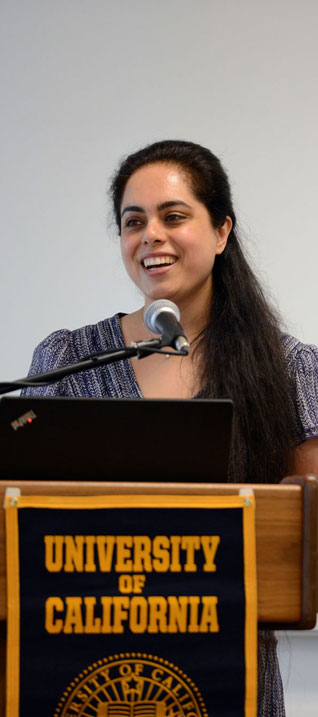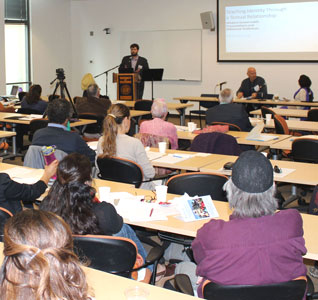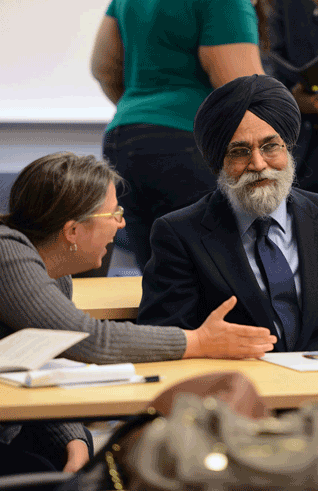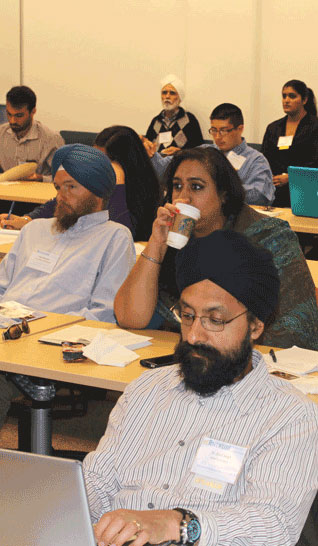
Photos by http://www.carrierosemaphotography.com/, UCR student Rutdow Jiraprapasuke, and the author.



Current Events
Scholars Ruminate On Generation Y Sikhs:
Sikh Studies Conference,
University of California, Riverside, USA
CHARLES M. TOWNSEND
On May 8-10, 2015, the Dr. Jasbir Singh Saini Endowed Chair in Sikh and Punjabi Studies and the Department of Religious Studies at the University of California, Riverside ("UCR"), USA, hosted their fourth large international academic conference in the field of Sikh Studies.
I co-organized the conference with Dr. Pashaura Singh (Professor and Chair of Religious Studies and holder of the Dr. J.S. Saini Chair at UCR) and Dr. Verne A. Dusenbery (Professor of Anthropology and Chair of Global Studies, Hamline University, St. Paul, Minnesota), and with the help of UCR staff members and graduate and undergraduate students.
The conference involved 26 presenters -- representing universities and Sikh organizations in the US, UK, Canada, India, Norway, Denmark, Italy, and Singapore -- as well as UCR administrators, faculty, and staff, and more than 20 UCR student volunteers.
The conference was organized around the title and theme of “Living and Making Sikhi in the Diaspora: the Millennial Generation Comes of Age.”
The term ‘millennial’ (a.k.a. ‘Generation Y’) within the conference title refers to the popularly used identifier for the current generation of people worldwide who were born between the early 1980s and the early 2000s. Thus the conference was conceived to bring focus to the generation of young Sikhs that is currently ‘coming of age’ around the world today and panels and events throughout the conference were organized to engage with this theme and topics surrounding it in various ways.
Panelists and speakers throughout the conference included Sikh activists and educators, and Sikh and non-Sikh academics representing inter-disciplinary perspectives on the Sikh tradition, including: Religious Studies, Anthropology, Sociology, Global Studies, Asian Studies, History, Philosophy, Scriptural and Textual Studies, Economics, and other areas of research.
Because of the conference’s deliberate focus on living Sikhs of the current generation, scholars who utilize interview-based research methods -- including some who have been engaged in research within Sikh communities around the world for several decades -- were especially represented.
Continuing with the purpose of joining ‘town and gown’ of previous Sikh Studies conferences at UCR, all of the panels included lively discussion involving professors and graduate and undergraduate students from multiple departments at UCR, scholars from outside of Sikh Studies, members of Sikh organizations, and non-academicians and members of Sikh communities from California and beyond.
UCR Provost and Executive Vice Chancellor Dr. Paul D’Anieri was on hand to offer conference participants a warm greeting to UCR at the opening of the conference. Most of the panel presentations on the first day of the conference centered or touched on the theme of Sikh activism. In fact, I can say that in organizing the papers and presenters into panels, this focus on Sikh activism for the first day arose organically because so many of the original paper abstracts that were submitted in advance of the conference highlighted research on Sikh activists.
In my own research within Sikh communities in the U.S., the centrality of activism, social duty, and community involvement to Sikhs of the ‘millennial’ generation in living out their Sikhi is readily apparent. The centrality of this dimension of Sikh lives among the current generation around the world was affirmed and discussed through paper presentations focusing on Sikh environmentalism, political and social activism, youth groups, and work-life in Canadian, American, British, and Singaporean contexts.
On the last panel of the first day, I had the pleasure of chairing a panel of young activists representing three of the most active and largest Sikh activist organizations in the U.S.
Sapreet Kaur, Executive Director of the Sikh Coalition, Navdeep Singh, Policy Director of the Sikh American Legal Defense and Education Fund (SALDEF), and Ravneet Kaur, Director of Development of Jakara Movement participated in a roundtable discussion.
Each of them discussed their work and the work of their organization, connected this with broader themes of the conference, and shared personal stories about their paths to becoming Sikh activists. The latter half of the panel was a lively open discussion with the audience members.
Since each of the three Sikh organizations represented have a strong educational focus, the discussion offered a chance for direct engagement between academics and activists who are often engaged on the ground level in educating the broader public about Sikhs.
Many conference attendees told me that they felt this panel was one of the highlights of the conference.
On the first night, conference participants and visitors attended an awards dinner and keynote speech on the UCR campus. UCR Chancellor Dr. Kim A. Wilcox and Dean of UCR’s College of Arts, Humanities and Social Sciences Dr. Shaun Bowler were in attendance to give special welcoming remarks to the attendees.
Before the dinner, the more than 20 UCR students who had spent the day volunteering to help conference attendees and facilitate the conference events had time to chat with the Chancellor and Dean -- a happy opportunity for connection for me to see (on our campus of 21,000 students!).
Dr. Harkeerat Singh Dhillon, an orthopedic surgeon from Riverside who is a longtime Trustee of the UC Riverside Foundation and chaired the Campaign for Sikh Studies at UCR, delivered a further welcoming address. Dr. Pashaura Singh delivered the keynote speech, reflecting broadly on multiple ways that the current generation of Sikhs in North America are active in living Sikhi in new contexts.
It was a personal honor for me to introduce the two scholars who were chosen as honorees of the conference because their work has been such an enduring influence on my own research on Sikh Americans.
Dr. Bruce La Brack and Dr. Karen Isaksen Leonard were honored for their contributions to the study of Sikhs and Punjabis in North America.
Dr. La Brack is a cultural anthropologist and Professor Emeritus at the University of the Pacific (California, USA) who has conducted over 40 years of research on Sikhs and South Asians in the worldwide diaspora, and his ethnographic study, ‘The Sikhs of Northern California: 1904-1975’ is a foundational work on Sikhs in the U.S.
Dr. Leonard is a historian and anthropologist and Professor Emerita at UC Irvine (California, USA). She has conducted extensive ethnographic research on Punjabi and other South Asian American communities, and, in particular, her book ‘Making Ethnic Choices: California’s Punjabi Mexican Americans’ is a rich portrait of the families formed by early Sikh and other Punjabi immigrants to California and their marriages with Mexican women.
Panel presentations on the second day of the conference followed multiple focal points -- music, the internet, martial arts, literature, and more -- but most were unified by their investigation into the transmission of Sikh ways of being and knowing to new generations and how the current generation of Sikhs are living and making Sikhi anew in diverse ways within differing global contexts.
Geographically, paper presenters on the second day of the conference discussed the transmission of the Sikh tradition in the UK, US, Norway, and Italy.
The morning of the third day of the conference was given to a final round table discussion involving all of the conference participants in analyzing the points of resonance and difference between their work that had been touched on throughout the conference.
A closing event of the conference was a screening of the film ‘Waking in Oak Creek.’ I led a discussion of how the film might be used as a powerful educational tool for professors to discuss with students the incidents surrounding the massacre at the Gurdwara in Wisconsin, the realities of racism, religious bias, and xenophobia, and the rays of hope displayed in the actions following the tragedy by members of the Oak Creek Gurdwara community and the broader communities of supporters surrounding them.
I have the perspective of having participated in all four Sikh Studies conferences organized at UCR by Dr. Pashaura Singh under the auspices of the Dr. Jasbir Singh Saini Chair, and I noted that there were a couple of familiar ‘veterans’ of the four conferences in attendance. However, each of the conferences has been different, and there were many young scholars and new voices this time.
I was thankful once again to be involved in an interconnected and supportive field of scholars, to see three days of positive, open and collegial interaction between scholars and community members, and to see the enthusiastic support and involvement of members of the Sikh community and of UCR administrators, staff, and especially of our students.
Dr Charles M. Townsend is Lecturer, Department of Religious Studies, University of California, Riverside. He is on the Steering Committee, Sikh Studies Group, American Academy of Religion, as well as Co-Chair, Religions of Asia Section, American Academy of Religion, Western Region.
The original call for papers, conference program book, and abstracts of the
papers can be viewed by CLICKING here.
May 21, 2015
Conversation about this article
1: Paramjit Singh Grewal (Auckland, New Zealand ), May 22, 2015, 9:09 PM.
Well done.
2: Bhai Harbans Lal (Dallas, Texas, USA), May 24, 2015, 1:54 AM.
I was unable to attend due to some health issues. But I must congratulate the organizers of the conference for selecting a very timely theme for the conference. From the list of the participants, it is evident how our generation is coming up to take the responsibility of serving the community.


